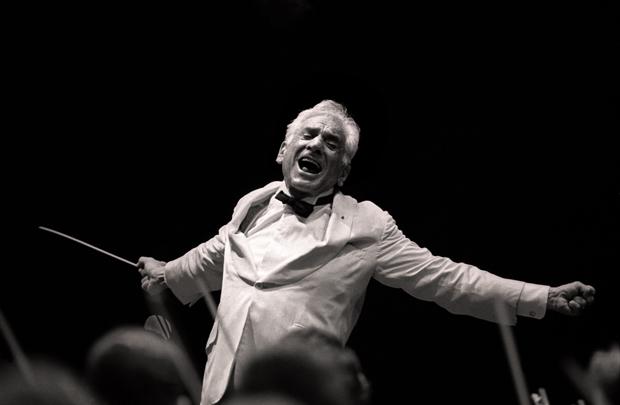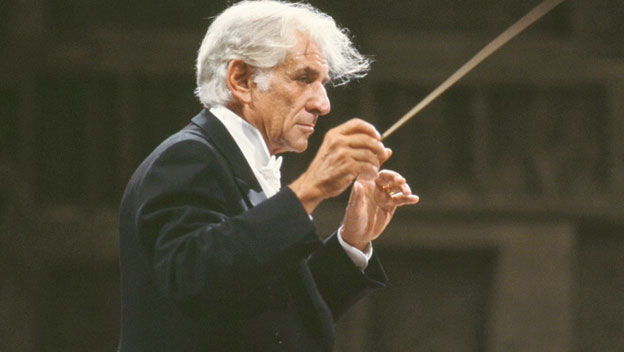Any great work of art ... revives and readapts time and space, and the measure of its success is the extent to which it makes you an inhabitant of that world ... the extent to which it invites you in and lets you breathe its strange, special air.
~ Leonard Bernstein (wiki) ("What Makes Opera Grand?", Vogue, December 1958)
Einstein said that "the most beautiful experience we can have is the mysterious." So why do so many of us try to explain the beauty of music, thus depriving it of its mystery?
~ Bernstein (The Unanswered Question)
Bernstein has been disclosing musical secrets that have been well known for 400 years.
~ Oscar Levant (1906-1972)* (Memories of an Amnesic)
Perhaps the chief requirement of [the conductor] is that he be humble before the composer, that he never interpose himself between the music and the audience; that all his efforts , however strenuous or glamorous, be made in the service of the composer's meaning - the music itself, which, after all, is the whole reason for the conductor's existence.
~ Bernstein (Bowen, ed., The Cambridge Companion to Conducting)
Today is the anniversary of the birth of American composer and conductor Leonard Bernstein (wiki) (1918-1990) in Lawrence, Massachusetts, the son of Ukrainian-Jewish parents. Bernstein showed extraordinary musical talent at the piano at an early age and after attending the Boston Latin School, majored in music at Harvard. After graduation, he went to Philadelphia's Curtis Institute, where he studied piano, conducting (under Fritz Reiner), and composition. Afterwards, in New York, Bernstein worked for several music publishers and became associated with the comedy troupe of Betty Comden, Adolph Green, and Judy Holliday.
Beginning in 1940, he began studying conducting at Tanglewood under the Boston Symphony's Serge Koussevitzky and got his famous "big break" in November 1943, when as assistant conductor of the New York Philharmonic, he substituted for the ailing Bruno Walter to major acclaim. Bernstein later became the music director of the New York City Symphony Orchestra, and his growing international reputation led to guest-conducting gigs all over the world. Meanwhile, he divided his compositional activities between musical comedy and symphonic music and eventually produced three symphonies, a variety of other orchestral works, and Broadway musicals such as On the Town (1943), Wonderful Town (1953), Candide (1956 - actually an operetta), and his exquisite West Side Story (1957).
Between 1958 and 1969 he served as musical director of the New York Philharmonic, conducted many world premieres of both old and new music, and almost single-handedly revived interest in the music of Gustav Mahler (1860-1911). He became even more famous as a music lecturer on television, which led to his best-selling books, The Joy of Music (1959) and The Infinite Variety of Music (1966). Later in his career Bernstein turned increasingly to conducting opera, in both the United States and Europe. As one of classical music's most popular superstars, he remained active as a guest conductor until the time of his death to a heart attack in 1990.
* N.B. Oscar Levant was an American pianist, composer, comedian, and author, particularly remembered for his sardonic wit.
The great Leonard Bernstein was such a showman of a conductor that he didn’t even need to use his baton to coax a great performance from the Vienna Philharmonic in this concert.
Watch Bernstein use only his eyebrows (and the odd bit of smiling and grimacing) to give the orchestra all the information they need about tempo and dynamics for Haydn’s Symphony No. 88. Amazing stuff:



No comments:
Post a Comment